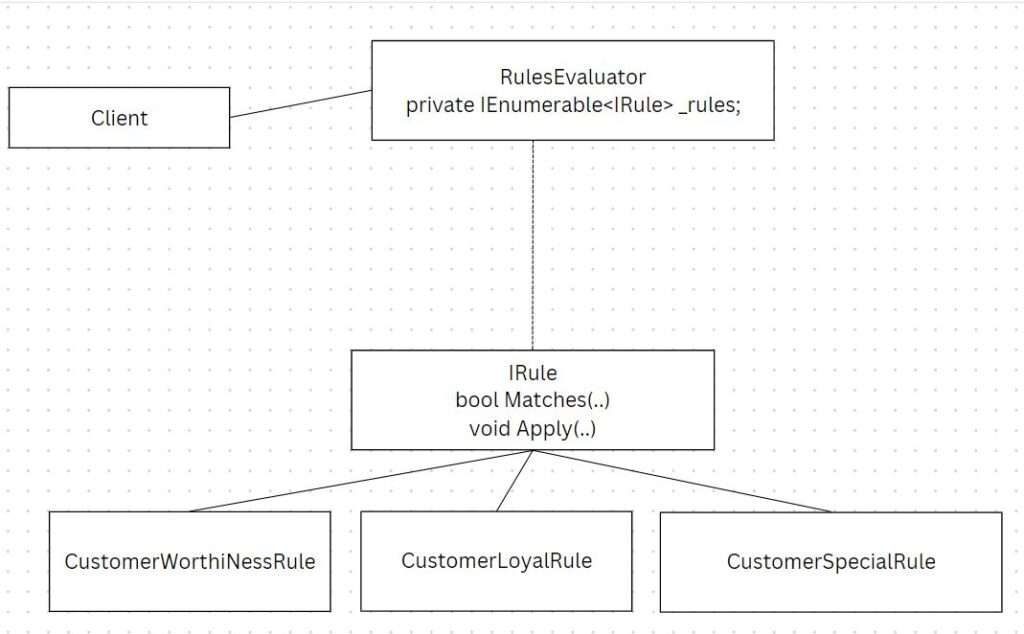- Behavioral pattern
- Rules design pattern helps the developer to encapsulate each business rule in a separate object and decouple the definition of business rules from their processing. New rules can be added without the need to modify the rest of the application logic.

namespace RulesPattern
{
public interface IRule
{
bool Matches(CustomerDetailModel input);
void Apply(CustomerDetailModel input);
}
public class RulesEvaluator
{
private IEnumerable<IRule> _rules;
public RulesEvaluator(IEnumerable<IRule> rules)
{
_rules =rules;
}
public void Execute(CustomerDetailModel customerDetailModel)
{
foreach (var rule in _rules)
{
if (rule.Matches(customerDetailModel))
{
rule.Apply(customerDetailModel);
}
}
}
}
public class CustomerWorthiNessRule : IRule
{
public void Apply(CustomerDetailModel input)
{
input.IsCustomerWorthiness = true;
}
public bool Matches(CustomerDetailModel input)
{
//some condition check here ...true or false..
return true;
}
}
public class CustomerLoyalRule : IRule
{
public void Apply(CustomerDetailModel input)
{
input.IsCustomerLoyal = true;
}
public bool Matches(CustomerDetailModel input)
{
//some condition check here ...true or false..
return true;
}
}
public class CustomerSpecialRule : IRule
{
public void Apply(CustomerDetailModel input)
{
//some condition check then return true or false..
input.IsCustomerSpecial = false;
}
public bool Matches(CustomerDetailModel input)
{
//some condition check here ...true or false..
return true;
}
}
public class CustomerValid : IRule
{
public void Apply(CustomerDetailModel input)
{
input.IsCustomerValid = true;
}
public bool Matches(CustomerDetailModel input)
{
//some condition check here ...true or false..
return true;
}
}
}
CustomerDetailModel
namespace RulesPattern
{
public class CustomerDetailModel
{
public int Id { get; set; }
public bool IsCustomerWorthiness { get; set; }
public bool IsCustomerLoyal { get; set; }
public bool IsCustomerSpecial { get; set; }
public bool IsCustomerValid { get; set; }
}
}
PROGRAM.CS
using RulesPattern;
var custDetailModel = new CustomerDetailModel();
var rules = new List<IRule>()
{
new CustomerWorthiNessRule(),
new CustomerLoyalRule(),
new CustomerSpecialRule(),
new CustomerValid()
};
new RulesEvaluator(rules).Execute(custDetailModel);
Console.WriteLine($"Is Customer Credit Valid ? {custDetailModel.IsCustomerValid}");
Console.WriteLine($"Is Customer Credit Worthy ? {custDetailModel.IsCustomerWorthiness}");
Console.WriteLine($"Is Customer Credit Special ? {custDetailModel.IsCustomerSpecial}");
Console.WriteLine($"Is Customer Credit Loyal ? {custDetailModel.IsCustomerLoyal}");
OUTPUT
Is Customer Credit Valid ? True
Is Customer Credit Worthy ? True
Is Customer Credit Special ? False
Is Customer Credit Loyal ? True
GITHUB
